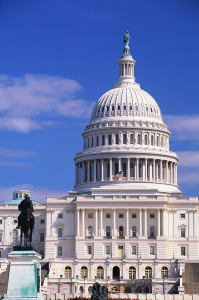
By Ted GlickOctober 26, 2010, Published by
Dissident Voice.
"Ultimately, many of the sentiments expressed by the tea partyers are deeply dishonest, deeply un-American. We need to keep them in their rightful place as a distinct, if sometimes loud, sometimes dangerous, political minority. We will do that to the extent that we out-organize them at the grassroots, engage in creative and significant mass action, and pressure the federal government to pass genuinely progressive legislation. That’s the way we’ll keep down the supporters of Rush Limbaugh and Glenn Beck."
This is how I concluded a Future Hope column on September 12th of last year reporting on the first major demonstration of what has become the Tea Party. I spent several hours at this 2009 demonstration at the U.S. Capitol in Washington, D.C., listening to the speakers, checking out the signs and feeling the crowd vibes. My overall assessment was that although the politics were very different, their action had a lot of similarities to the massive peace and justice demonstrations our side organized during the early years of the George W. Bush administration. These demonstrations, many of them much bigger than the one organized by the Tea Party, took place from 2002-2006, when the rightist-led Republicans controlled the White House and both houses of Congress. Being out of power, we back then and the tea partyers in 2009 both felt the need to demonstrate in the streets.
But with the emergence of the electoral-oriented Tea Party this year, the neo-rightists showed a strategic and tactical sophistication that the progressive left did not. They have successfully transformed a 2009 protest movement into a movement serious about winning political power via the ballot box, combined with continuing mass action, as we saw at the Glenn Beck late August Lincoln Memorial rally.

And all indications are that they will win not just a number of internal Republican Party primaries but a number of actual Senate and House seats. This doesn’t necessarily mean that they will be successful in taking the country backwards in the ways they would like. That very much remains to be seen, to be fought out over the next two years and beyond, but there is no question that they have had a major impact upon the politics of the USA. Why hasn’t the progressive left, those millions of people rooted in and, in some cases, leading a wide cross-section of local, state, regional and national progressive or liberal organizations and issue-oriented movements, done something similar? Why have the overwhelming majority of us seemingly gone along with two-party politics-as-usual? Why haven’t we organized ourselves into something like a left-wing Tea Party?
A good argument can be made that too many progressive leaders don’t have the guts to do what’s right. As Matthew Rothschild, editor of The Progressive magazine, recently wrote:
Where they saw Republicans who were too wishy-washy or too compromised, they [the Tea Party] went after them and took them down, and ran the most avowedly ideological candidates they could find. They didn’t bother offending the party establishment. They went around the establishment. And now they’re flexing their muscle and all but daring that establishment to stand in their way. As Sarah Palin said this week, ‘Some in the GOP—it’s their last shot. It’s their last chance.’ And she warned the establishment that if they don’t surrender, she can take the grassroots with her and start a third party. No major figure within the Democratic Party has had the guts to do this. And progressives have, by and large, found themselves paralyzed within the party. For far too many years, most progressives have played nice and played along.
There are exceptions: Ralph Nader, David Cobb, Cynthia McKinney, Progressive Democrats of America, progressives running as Greens, independents or in primary challenges to conservative or wishy-washy Dems. But these are exceptions to the dominant political and tactical dynamic within the progressive left.

Another reason for the Tea Party success is the huge sums of money provided to them by rightist millionaires and billionaires. Though there are left-wing millionaires and billionaires too, there aren’t as many, and there are proportionately fewer willing to buck the established ways that things have been done in the political arena for decades.
The rightist media: without question Fox News, Glenn Beck, Rush Limbaugh, Sean Hannity and all the other right-wing media have provided significant motivation and support for the Tea Party movement.
But in my opinion probably the most significant reason for our situation, the ruts of our own making that have allowed the corporate-supporting Republicans, Democrats and Tea Partyites to dominate U.S. politics, is our inability to bridge the divides between those who are working mainly in support of progressives within the Democratic Party, those who are organizing independent and outside of it in the Green Party or other independent parties, and those who are abstaining from any involvement in the electoral system at all.

As long as we are divided into our progressive Democrat, third party or abstentionist camps; as long as we are unable to unite around a truly progressive agenda and build unity of action in support of it; as long as we allow left sectarians or centrist sectarians to influence us and prevent us from building the working unity we need; and, as long as we refuse to consider ways that we can forge a unified, activist alliance that will support both progressive Democratic and independent candidacies, with decisions as to who determined democratically—that is how long we will remain in the political wilderness.
Perhaps there is some hope for change. It was a positive thing that the labor movement and the NAACP took the initiative to organize the One Nation Working Together demonstration in D.C. on October 2nd. Will that coalition, or significant sectors of it, see and act upon the need for something on-going after November 2nd?
There is talk within the climate movement about running/supporting candidates who prioritize the building of a clean energy economy. Given the energy and organization within that movement, as indicated by the 2,000 or so local actions on the same day that were organized for two consecutive years, perhaps it will play a leadership role in advancing what we need.
It is clear that just supporting whoever the Democrats come up with isn’t working. It’s time for a change we can believe in as far as how we do politics from the left in the USA.
Ted Glick has been active in the progressive and climate movements since 1968.

 By Ted GlickOctober 26, 2010, Published by Dissident Voice.
"Ultimately, many of the sentiments expressed by the tea partyers are deeply dishonest, deeply un-American. We need to keep them in their rightful place as a distinct, if sometimes loud, sometimes dangerous, political minority. We will do that to the extent that we out-organize them at the grassroots, engage in creative and significant mass action, and pressure the federal government to pass genuinely progressive legislation. That’s the way we’ll keep down the supporters of Rush Limbaugh and Glenn Beck."
This is how I concluded a Future Hope column on September 12th of last year reporting on the first major demonstration of what has become the Tea Party. I spent several hours at this 2009 demonstration at the U.S. Capitol in Washington, D.C., listening to the speakers, checking out the signs and feeling the crowd vibes. My overall assessment was that although the politics were very different, their action had a lot of similarities to the massive peace and justice demonstrations our side organized during the early years of the George W. Bush administration. These demonstrations, many of them much bigger than the one organized by the Tea Party, took place from 2002-2006, when the rightist-led Republicans controlled the White House and both houses of Congress. Being out of power, we back then and the tea partyers in 2009 both felt the need to demonstrate in the streets.
But with the emergence of the electoral-oriented Tea Party this year, the neo-rightists showed a strategic and tactical sophistication that the progressive left did not. They have successfully transformed a 2009 protest movement into a movement serious about winning political power via the ballot box, combined with continuing mass action, as we saw at the Glenn Beck late August Lincoln Memorial rally.
By Ted GlickOctober 26, 2010, Published by Dissident Voice.
"Ultimately, many of the sentiments expressed by the tea partyers are deeply dishonest, deeply un-American. We need to keep them in their rightful place as a distinct, if sometimes loud, sometimes dangerous, political minority. We will do that to the extent that we out-organize them at the grassroots, engage in creative and significant mass action, and pressure the federal government to pass genuinely progressive legislation. That’s the way we’ll keep down the supporters of Rush Limbaugh and Glenn Beck."
This is how I concluded a Future Hope column on September 12th of last year reporting on the first major demonstration of what has become the Tea Party. I spent several hours at this 2009 demonstration at the U.S. Capitol in Washington, D.C., listening to the speakers, checking out the signs and feeling the crowd vibes. My overall assessment was that although the politics were very different, their action had a lot of similarities to the massive peace and justice demonstrations our side organized during the early years of the George W. Bush administration. These demonstrations, many of them much bigger than the one organized by the Tea Party, took place from 2002-2006, when the rightist-led Republicans controlled the White House and both houses of Congress. Being out of power, we back then and the tea partyers in 2009 both felt the need to demonstrate in the streets.
But with the emergence of the electoral-oriented Tea Party this year, the neo-rightists showed a strategic and tactical sophistication that the progressive left did not. They have successfully transformed a 2009 protest movement into a movement serious about winning political power via the ballot box, combined with continuing mass action, as we saw at the Glenn Beck late August Lincoln Memorial rally.
 And all indications are that they will win not just a number of internal Republican Party primaries but a number of actual Senate and House seats. This doesn’t necessarily mean that they will be successful in taking the country backwards in the ways they would like. That very much remains to be seen, to be fought out over the next two years and beyond, but there is no question that they have had a major impact upon the politics of the USA. Why hasn’t the progressive left, those millions of people rooted in and, in some cases, leading a wide cross-section of local, state, regional and national progressive or liberal organizations and issue-oriented movements, done something similar? Why have the overwhelming majority of us seemingly gone along with two-party politics-as-usual? Why haven’t we organized ourselves into something like a left-wing Tea Party?
A good argument can be made that too many progressive leaders don’t have the guts to do what’s right. As Matthew Rothschild, editor of The Progressive magazine, recently wrote:
Where they saw Republicans who were too wishy-washy or too compromised, they [the Tea Party] went after them and took them down, and ran the most avowedly ideological candidates they could find. They didn’t bother offending the party establishment. They went around the establishment. And now they’re flexing their muscle and all but daring that establishment to stand in their way. As Sarah Palin said this week, ‘Some in the GOP—it’s their last shot. It’s their last chance.’ And she warned the establishment that if they don’t surrender, she can take the grassroots with her and start a third party. No major figure within the Democratic Party has had the guts to do this. And progressives have, by and large, found themselves paralyzed within the party. For far too many years, most progressives have played nice and played along.
There are exceptions: Ralph Nader, David Cobb, Cynthia McKinney, Progressive Democrats of America, progressives running as Greens, independents or in primary challenges to conservative or wishy-washy Dems. But these are exceptions to the dominant political and tactical dynamic within the progressive left.
And all indications are that they will win not just a number of internal Republican Party primaries but a number of actual Senate and House seats. This doesn’t necessarily mean that they will be successful in taking the country backwards in the ways they would like. That very much remains to be seen, to be fought out over the next two years and beyond, but there is no question that they have had a major impact upon the politics of the USA. Why hasn’t the progressive left, those millions of people rooted in and, in some cases, leading a wide cross-section of local, state, regional and national progressive or liberal organizations and issue-oriented movements, done something similar? Why have the overwhelming majority of us seemingly gone along with two-party politics-as-usual? Why haven’t we organized ourselves into something like a left-wing Tea Party?
A good argument can be made that too many progressive leaders don’t have the guts to do what’s right. As Matthew Rothschild, editor of The Progressive magazine, recently wrote:
Where they saw Republicans who were too wishy-washy or too compromised, they [the Tea Party] went after them and took them down, and ran the most avowedly ideological candidates they could find. They didn’t bother offending the party establishment. They went around the establishment. And now they’re flexing their muscle and all but daring that establishment to stand in their way. As Sarah Palin said this week, ‘Some in the GOP—it’s their last shot. It’s their last chance.’ And she warned the establishment that if they don’t surrender, she can take the grassroots with her and start a third party. No major figure within the Democratic Party has had the guts to do this. And progressives have, by and large, found themselves paralyzed within the party. For far too many years, most progressives have played nice and played along.
There are exceptions: Ralph Nader, David Cobb, Cynthia McKinney, Progressive Democrats of America, progressives running as Greens, independents or in primary challenges to conservative or wishy-washy Dems. But these are exceptions to the dominant political and tactical dynamic within the progressive left.
 Another reason for the Tea Party success is the huge sums of money provided to them by rightist millionaires and billionaires. Though there are left-wing millionaires and billionaires too, there aren’t as many, and there are proportionately fewer willing to buck the established ways that things have been done in the political arena for decades.
The rightist media: without question Fox News, Glenn Beck, Rush Limbaugh, Sean Hannity and all the other right-wing media have provided significant motivation and support for the Tea Party movement.
But in my opinion probably the most significant reason for our situation, the ruts of our own making that have allowed the corporate-supporting Republicans, Democrats and Tea Partyites to dominate U.S. politics, is our inability to bridge the divides between those who are working mainly in support of progressives within the Democratic Party, those who are organizing independent and outside of it in the Green Party or other independent parties, and those who are abstaining from any involvement in the electoral system at all.
Another reason for the Tea Party success is the huge sums of money provided to them by rightist millionaires and billionaires. Though there are left-wing millionaires and billionaires too, there aren’t as many, and there are proportionately fewer willing to buck the established ways that things have been done in the political arena for decades.
The rightist media: without question Fox News, Glenn Beck, Rush Limbaugh, Sean Hannity and all the other right-wing media have provided significant motivation and support for the Tea Party movement.
But in my opinion probably the most significant reason for our situation, the ruts of our own making that have allowed the corporate-supporting Republicans, Democrats and Tea Partyites to dominate U.S. politics, is our inability to bridge the divides between those who are working mainly in support of progressives within the Democratic Party, those who are organizing independent and outside of it in the Green Party or other independent parties, and those who are abstaining from any involvement in the electoral system at all.
 As long as we are divided into our progressive Democrat, third party or abstentionist camps; as long as we are unable to unite around a truly progressive agenda and build unity of action in support of it; as long as we allow left sectarians or centrist sectarians to influence us and prevent us from building the working unity we need; and, as long as we refuse to consider ways that we can forge a unified, activist alliance that will support both progressive Democratic and independent candidacies, with decisions as to who determined democratically—that is how long we will remain in the political wilderness.
Perhaps there is some hope for change. It was a positive thing that the labor movement and the NAACP took the initiative to organize the One Nation Working Together demonstration in D.C. on October 2nd. Will that coalition, or significant sectors of it, see and act upon the need for something on-going after November 2nd?
There is talk within the climate movement about running/supporting candidates who prioritize the building of a clean energy economy. Given the energy and organization within that movement, as indicated by the 2,000 or so local actions on the same day that were organized for two consecutive years, perhaps it will play a leadership role in advancing what we need.
It is clear that just supporting whoever the Democrats come up with isn’t working. It’s time for a change we can believe in as far as how we do politics from the left in the USA.
Ted Glick has been active in the progressive and climate movements since 1968.
As long as we are divided into our progressive Democrat, third party or abstentionist camps; as long as we are unable to unite around a truly progressive agenda and build unity of action in support of it; as long as we allow left sectarians or centrist sectarians to influence us and prevent us from building the working unity we need; and, as long as we refuse to consider ways that we can forge a unified, activist alliance that will support both progressive Democratic and independent candidacies, with decisions as to who determined democratically—that is how long we will remain in the political wilderness.
Perhaps there is some hope for change. It was a positive thing that the labor movement and the NAACP took the initiative to organize the One Nation Working Together demonstration in D.C. on October 2nd. Will that coalition, or significant sectors of it, see and act upon the need for something on-going after November 2nd?
There is talk within the climate movement about running/supporting candidates who prioritize the building of a clean energy economy. Given the energy and organization within that movement, as indicated by the 2,000 or so local actions on the same day that were organized for two consecutive years, perhaps it will play a leadership role in advancing what we need.
It is clear that just supporting whoever the Democrats come up with isn’t working. It’s time for a change we can believe in as far as how we do politics from the left in the USA.
Ted Glick has been active in the progressive and climate movements since 1968.







